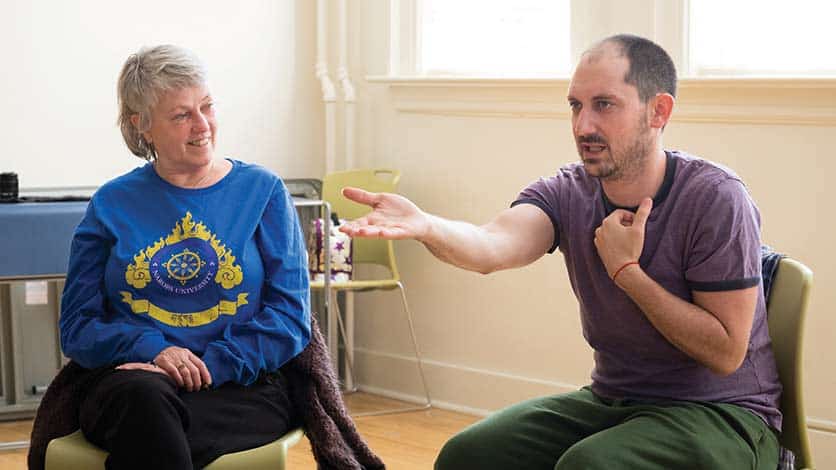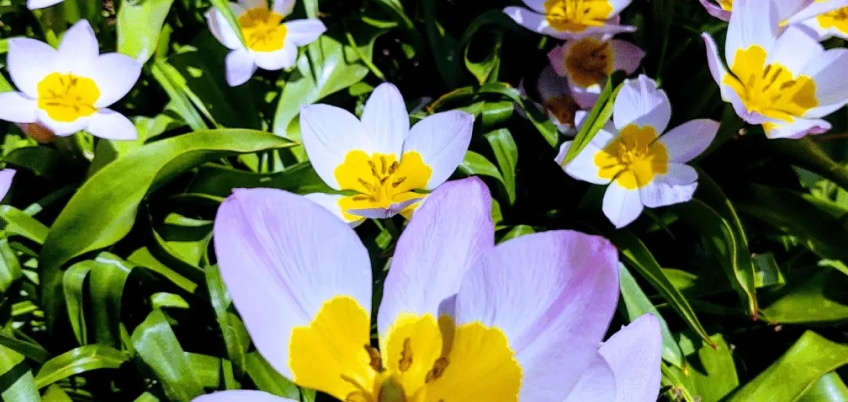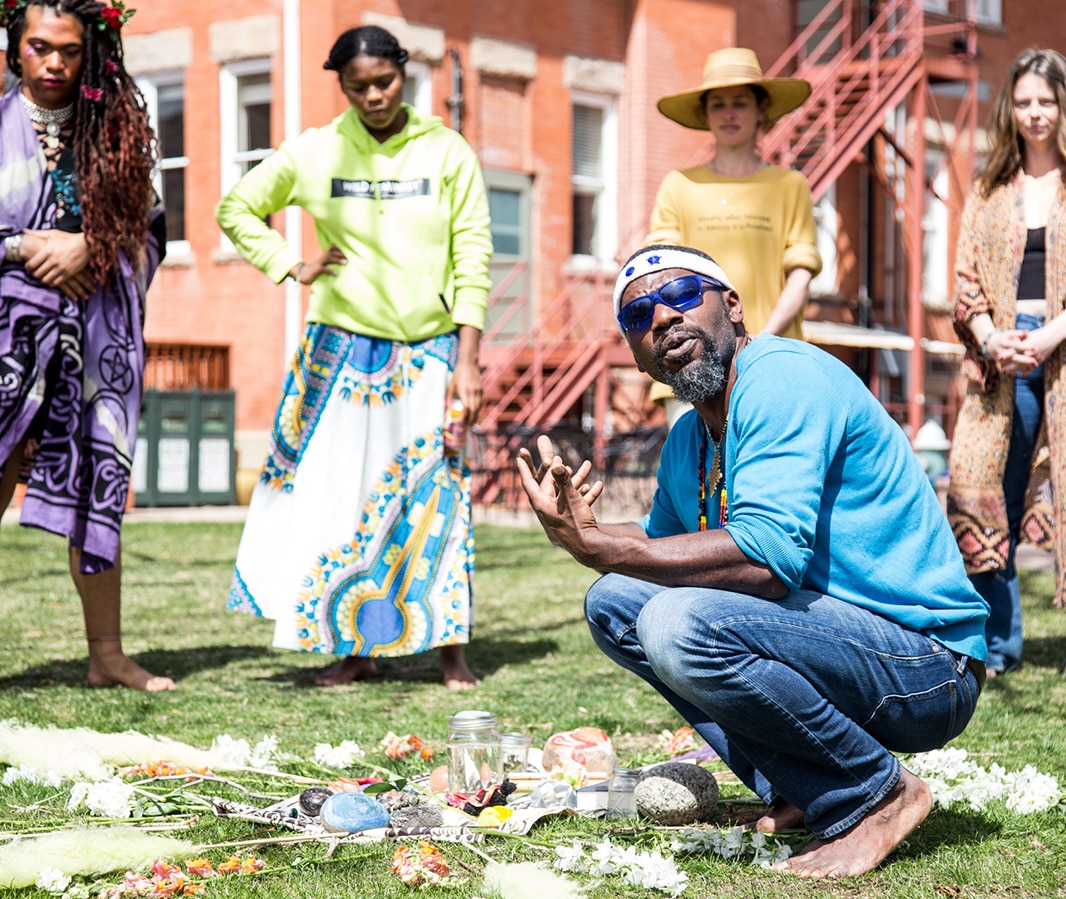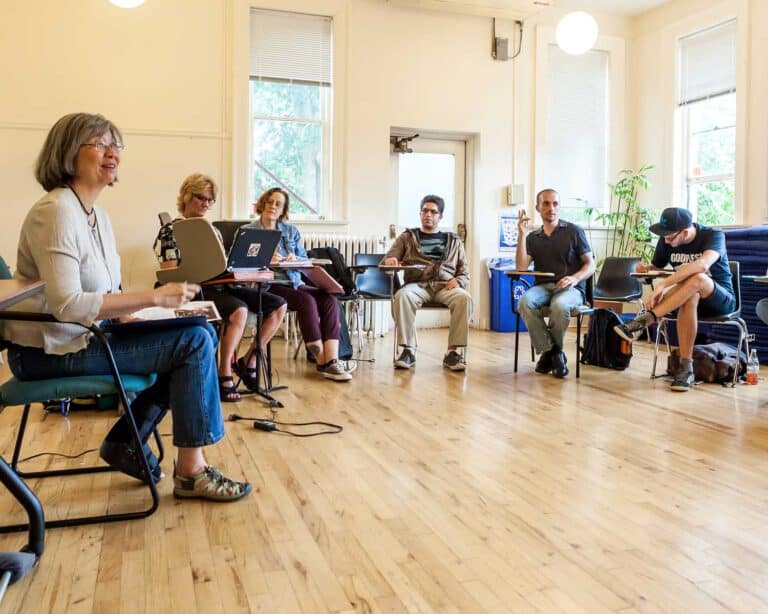Master of Divinity
MDiv Degree
Earn your Master of Divinity at Naropa, the West’s first Buddhist-inspired university. Our interreligious spiritual care degree values innovation and social engagement while remaining deeply rooted in contemplative practice.
Program Overview
The Naropa Master of Divinity program uniquely prepares chaplains and spiritual community-builders for lives of contemplative leadership. Our Buddhist-inspired divinity program functions as an interreligious seminary, welcoming graduate students who represent a diversity of spiritual and religious backgrounds. This three-year accredited program combines deep theological study, community engagement, interreligious spiritual care, and meditation practice, all within a real-world context. Each pathway is grounded in contemplative insights, meditation practices, and clinical training. You may also choose to complete Mindfulness Instructor Training as an optional specialty.
Interreligious & Interspiritual Approach
Unlike traditional MDiv degrees, Naropa welcomes students of all faiths and spiritualities, allowing them to pursue their personal divinity journey within an academic setting with hands-on experience opportunities. While the MDiv degree program requires students to engage in contemplative practices, there is no presumption about how the students identify themselves within a specific religious tradition.
Four Streams of Learning
Our MDiv degree prepares students through four streams of learning:
- Theological study—an in-depth understanding of the basic Buddhist texts and doctrines in historical and present-day contexts
- Community—devoted to the insights and tools for fostering “engaged” communities
- Interfaith Pastoral Care—the ability to serve the spiritual and human needs of a diverse community in ministerial/ chaplaincy roles while embodying the principles and practices of one’s primary tradition
- Practice and Meditation—the spiritual practice of sitting meditation from the Buddhist tradition.
Chaplaincy Internships
Each Master of Divinity student will apply their classroom learning in an ACPE-accredited Clinical Pastoral Education internship. Our Internships provide a context for integrating all four streams of learning and applying them to real-world needs while initiating the process of lifetime learning through the students’ work.
Quick Facts
- Unique interreligious & interspiritual Degree
- Contemplative Campus
- Flexible Start Dates
- Optional Specialties
- Chaplaincy Internships
- 75% of our graduate students receive financial aid and/or scholarships
- Unique interreligious & interspiritual Degree
- Remote learning
- Flexible Start Dates
- Chaplaincy Internships
- 4 in-person residential retreats
- 75% of our graduate students receive financial aid and/or scholarships
- Applications open for Summer and Fall 2025
Program Format
Naropa’s Master of Divinity offers two pathways for graduate students. Those who prefer in-person courses can study on our Boulder, Colorado, campus. Graduate students who wish to remain in their current zip code can enroll in our low-residency program. This allows students to do most of their study online, connecting with Naropa faculty and divinity program peers during residential retreats. Each pathway is rooted in contemplative philosophy and practice. Both the on-campus and low-residency degree options share four residential retreats – three nine-day retreats and one seven-day retreat – that bring the students together with their faculty to build community and provide a face-to-face, intensive engagement with contemplative education.

Master of Divinity Course Spotlight
Ethics & Spiritual Caregiving
This course explores the ethics of spiritual caregiving in diverse contexts within the field of professional spiritual care, with a particular focus on empowerment and change agency. Readings and discussions will engage current and abiding ethical considerations such as healthy professional boundaries, the role of chaplains in guiding and supporting ethical deliberation, and complex ethical dilemmas in healthcare such as physician-assisted dying, resource allocation, and end-of-life decision-making.
Degree
Requirements
Naropa’s Master of Divinity is a 72-credit, three-year program firmly grounded in Buddhist philosophy and meditation practice, emphasizing an interreligious approach to individual and community care. In addition to in-person retreats, the MDiv program includes a noncredit, seven-day Contemplative Practice Intensive requirement, completed at a retreat center of the student’s choosing. Regular coursework features four meditation practicum courses complementing core Buddhist teachings. Students are paired with personal Meditation Instructors and engage in five hours of meditation weekly.
Low-Residency MDiv Requirements
Students opt for a summer start or fall start with an additional semester to distribute coursework, accommodating busy schedules. The low-residency program offers on-demand programming instead of live class meetings.
Low-Residency Course Schedule - Summer Start First Year, Summer
First Year, Summer
- REL605e Pathways of Spiritual Care (2)
- REL749e Contemporary American Religion (3)
- Religious Studies Electives (1)
- Subtotal: 6 credits
First Year, Fall
All courses include a nine-day retreat during the first few weeks of the semester.
- REL600e Meditation Practicum I: Seeds of Peace (3)
- REL611e First Turning of the Wheel: Nature of Mind and Emotions (3)
- REL602e Contemplative Communication in Spiritual Caregiving (3)
- Subtotal: 9 credits
First Year, Spring
- All courses include a nine-day retreat during the first few weeks of the semester.
- REL615e Power, Privilege, and Diversity (3)
- REL614e Mind and Its World (3)
- REL620e Meditation Practicum II: Self & No-Self (3)
- Subtotal: 9 credits
Second Year, Summer
- Religious Studies Electives (7)
- Optional Electives or Nitartha Institute Shedra-Gomdra Option, Monthlong Summer program *
- REL547 Contemplative Practice Intensive—Mahamudra Meditation (3)
- REL701 The Middle Way School (3)
- Subtotal: 7 credits
Second Year, Fall
- REL635e Meditation Practicum III: Mind-Training (3)
- REL661e Second Turning of the Wheel: The Bodhisattva Path (3)
- REL714e Introduction to Spiritual Care (3)
- REL651e Contemplative Meditation Intensive (noncredit) (0)
- Subtotal: 9 credits
Second Year, Spring
- Some courses include a nine-day retreat during the first few weeks of the semester.
- REL710e Third Turning of the Wheel: Yogacara and Buddha Nature (3)
- REL780e Meditation Practicum IV: Maitri and Mandala (3)
- REL779e Interreligious Dialog (3)
- Subtotal: 9 credits
Third Year, Summer
- REL853e MDiv Capstone Seminar (3)
- Religious Studies Electives (4)
- Subtotal: 7 credits
Third Year, Fall
- REL747e Clinical Pastoral Education (6)
- REL804e Ethics and Spiritual Caregiving (3)
- Subtotal: 9 credits
Third Year, Spring
- Some courses include a nine-day retreat during the last few weeks of the semester.
- REL658e Ritual Arts (3)
- REL763e Art of Spiritual Teaching and Formation (3)
- REL880e Comprehensive Exam (noncredit)
- REL885e Master’s Project OR REL884e MDIV Thesis (1)
- Subtotal: 7 credits
Total Credits: 72
Low-Residency Course Schedule - Fall Start
It takes three years and one summer semester to complete.
First Year, Fall
- All courses include a nine-day retreat during the first few weeks of the semester.
- REL600e Meditation Practicum I: Seeds of Peace (3)
- REL611e First Turning of the Wheel: Nature of Mind and Emotions (3)
- REL602e Contemplative Communication in Spiritual Caregiving (3)
- Subtotal: 9 credits
First Year, Spring
- All courses include a nine-day retreat during the first few weeks of the semester.
- REL615e Power, Privilege, and Diversity (3)
- REL620e Meditation Practicum II: Self & No-Self (3)
- REL614e Mind and Its World (3)
- Religious Studies Electives (3)
- Subtotal: 12 credits
First Year, Summer
- REL605e Pathways of Spiritual Care (2)
- REL749e Contemporary American Religions (3)
- Religious Studies Electives (1)
- Subtotal: 6 credits
Second Year, Fall
- REL635e Meditation Practicum III: Mind-Training (3)
- REL661e Second Turning of the Wheel: The Bodhisattva Path (3)
- REL714e Introduction to Spiritual Care (3)
- REL651 Contemplative Meditation Intensive (noncredit)
- Religious Studies Electives (3)
- Subtotal: 12 credits
Second Year, Spring
- Some courses include a nine-day retreat during the first few weeks of the semester.
- REL780e Meditation Practicum IV: Maitri and Mandala (3)
- REL710e Third Turning of the Wheel: Yogacara and Buddha Nature (3)
- REL779e Interspiritual Dialogue (3)
- Religious Studies Electives (1)
- Subtotal: 10 credits
Second Year, Summer
- REL853e MDIV Capstone Seminar (3)
- Religious Studies Electives (4)
- Subtotal: 7 credits
Third Year, Fall
- REL747e Clinical Pastoral Education (6)
- REL804 Ethics and Spiritual Caregiving (3)
- Subtotal: 9 credits
Third Year, Spring
- Some courses include a nine-day retreat during the last few weeks of the semester.
- REL658 Ritual Arts (3)
- REL763 Art of Spiritual Teaching and Formation (3)
- REL880 Comprehensive Exam (noncredit)
- REL885 Master’s Project OR REL884 MDIV Thesis (1)
- Subtotal: 7 credits
Third Year, Summer
- Optional Electives or Nitartha Institute Shedra-Gomdra Option, Month Long Residential Summer Program
- REL547 Contemplative Practice Intensive—Mahamudra Meditation (3)
- REL701 The Middle Way School (3)
- Subtotal: 0-6 credits
Total Credits: 72
Fall Online Electives
- REL577e The History and Philosophies of Yoga (3)
- REL617e Meditation in Yogic and Tantric Traditions (3)
- REL634e Hindu Tantra (3)
- REL507/507e Sanskrit I (4)
- TRA515e Yoga I (3)
- REL645/645e Methods and Issues in the Study of Religion (3)
- REL699 Independent Study (0.5–4)
Fall Residential Electives
- REL590 Special Topics in Religious Studies: Queer Theory (3)
- REL623 Religious Experience in Africa: Sacred Cosmos, Ritual, and Community (3) (SP23)
- TRA503 Yoga History/Theory/Philosophy (3)
- TRA505 Taijiquan I (3)
- TRA520 Ikebana/Kado I (3)
- REL504W Breeze of Simplicity: Meditation Weekend (1)
- *REL609W Mindfulness Instructor Training I (1)
- REL809W Mindfulness Instructor Training III (1)
Spring Online Electives
- PSYE790e Topics in Ecopsychology (3) SP
- REL530e Yoga and Globalization: The Inception of Postural Yoga (3)
- REL535e Kabbalah and Consciousness (3)
- REL672e Non-Dualism in Theory and Practice (3) (SP23) TRA515e Yoga I (3)
- REL546/546e Buddhism and Modernity (3)
- REL655/655e Trends in Religious Studies (3)
- REL699 Independent Study (0.5–4)
- REL751/ REL751e Buddhism in Tibet (3) even years
- REL760/760e Buddhist Tantra (3) (prerequisite REL661 or REL614) Odd years
Spring Residential Electives
- REL540 Zen Buddhism (3)
- TRA512 Yoga Meditation (3)
- REL554W Opening the Heart: Meditation Weekend (1)
- REL525 Contemplative Christianity (3)
- REL529 Contemplative Judaism (3)
- **REL701 The Middle Way”
On-Campus MDiv Requirements
On-Campus Course Schedule - Summer Start
First Year, Summer
- REL605e Pathways of Spiritual Care (2)
- REL749e Contemporary American Religion (3)
- Religious Studies Electives (1)
Subtotal: 6
First Year, Fall
- REL600 Meditation Practicum I: Seeds of Peace (3)
- REL611 First Turning of the Wheel: Nature of Mind and Emotions (3)
- REL602 Contemplative Communication in Spiritual Caregiving (3)
Subtotal: 9
First Year, Spring
- REL615 Power, Privilege, and Diversity (3)
- REL620 Meditation Practicum II: Self and No-Self (3)
- REL614 Mind and It’s World (3)
Subtotal: 9
First Year Summer
Religious Studies Electives (6)
Optional Electives: Nitartha Institute Shedra-Gomdra Option only, Monthlong Summer program *
- REL547 Contemplative Practice Intensive—Mahamudra Meditation (3)
- REL701 The Middle Way School (3)
Subtotal: 6
Second Year, Fall
- REL635 Meditation Practicum III: Mind-Training (3)
- REL661 Second Turning of the Wheel: The Bodhisattva Path (3)
- REL714 Introduction to Spiritual Care (3)
- REL651e Contemplative Meditation Intensive (noncredit)** (0)
Subtotal: 9
Second Year, Spring
- REL710 Third Turning of the Wheel: Yogacara and Buddha Nature (3)
- REL780 Meditation Practicum IV: Maitri and Mandala (3)
- REL779 Interreligious Dialog (3)
Religious Studies Electives (1)
Subtotal: 10
Second Year, Summer
- REL853e MDiv Capstone Seminar (3)
- Religious Studies Electives (4)
Subtotal: 7
Third Year, Fall
- REL747e Clinical Pastoral Education (6)
- REL804 Ethics and Spiritual Caregiving (3)
Subtotal: 9
Third Year, Spring
Some courses include a nine-day retreat during the last few weeks of the semester.
- REL658 Ritual Arts (3)
- REL763 Art of Spiritual Teaching and Formation (3)
- REL880 Comprehensive Exam (0)
- REL885 Master’s Project /REL884 MDIV Thesis (1)
Subtotal: 7
Total Credits: 72
On-Campus Course Schedule - Fall Start
Takes three years to complete.
First Year, Fall
All courses include a nine-day retreat during the first few weeks of the semester.
- REL600 Meditation Practicum I: Seeds of Peace (3)
- REL611 First Turning of the Wheel: Nature of Mind and Emotions (3)
- REL602 Contemplative Communication in Spiritual Caregiving (3)
Subtotal: 9
First Year, Spring
All courses include a nine-day retreat during the first few weeks of the semester.
- REL615 Power, Privilege, and Diversity (3)
- REL620 Meditation Practicum II: Self & No-Self (3)
- REL614 Mind and Its World (3)
Religious Studies Electives (3)
Subtotal: 12
First Year, Summer
- REL605e Pathways of Spiritual Care (2)
- REL749e Contemporary American Religions (3)
- Religious Studies Electives (1)
Subtotal: 6
Second Year, Fall
- REL635 Meditation Practicum III: Mind-Training (3)
- REL661 Second Turning of the Wheel: The Bodhisattva Path (3)
- REL714 Introduction to Spiritual Care (3)
- REL651 Contemplative Meditation Intensive (noncredit)
- Religious Studies Electives (3)
Subtotal: 12
Second Year, Spring
Some courses include a nine-day retreat during the first few weeks of the semester.
- REL780 Meditation Practicum IV: Maitri and Mandala (3)
- REL710 Third Turning of the Wheel: Yogacara and Buddha Nature (3)
- REL779 Interspiritual Dialogue (3)
Religious Studies Electives (1)
Subtotal: 10
Second Year, Summer
- REL853e MDIV Capstone Seminar (3)
- Religious Studies Electives (4)
Subtotal: 7
Third Year, Fall
- REL747e Clinical Pastoral Education (6)
- REL804 Ethics and Spiritual Caregiving (3)
Subtotal: 9
Third Year, Spring
Some courses include a nine-day retreat during the last few weeks of the semester.
- REL658 Ritual Arts (3)
- REL763 Art of Spiritual Teaching and Formation (3)
- REL880 Comprehensive Exam (noncredit)
- REL885 Master’s Project OR REL884 MDIV Thesis (1)
Subtotal: 7
Third Year, Summer
Optional Electives or Nitartha Institute Shedra-Gomdra Option only, Monthlong Residential Summer Program
- REL547 Contemplative Practice Intensive—Mahamudra Meditation (3)
- REL701 The Middle Way School (3)
Subtotal: 0-6
Total Credits: 72
Fall Online Electives
- REL577e The History and Philosophies of Yoga (3)
- REL617e Meditation in Yogic and Tantric Traditions (3)
- REL634e Hindu Tantra (3)
- REL507/507e Sanskrit I (4)
- TRA515e Yoga I (3)
- REL645/645e Methods and Issues in the Study of Religion (3)
- REL699 Independent Study (0.5–4)
Fall Residential Electives
- REL590 Special Topics in Religious Studies: Queer Theory (3)
- REL623 Religious Experience in Africa: Sacred Cosmos, Ritual, and Community (3) (SP23)
- TRA503 Yoga History/Theory/Philosophy (3)
- TRA505 Taijiquan I (3)
- TRA520 Ikebana/Kado I (3)
- REL504W Breeze of Simplicity: Meditation Weekend (1)
- REL609W Mindfulness Instructor Training I (1)*
- REL809W Mindfulness Instructor Training III (1)*
Spring Online Electives
- PSYE790e Topics in Ecopsychology (3) SP
- REL530e Yoga and Globalization: The Inception of Postural Yoga (3)
- REL535e Kabbalah and Consciousness (3)
- REL672e Non-Dualism in Theory and Practice (3) (SP23) TRA515e Yoga I (3)
- REL546/546e Buddhism and Modernity (3)
- REL655/655e Trends in Religious Studies (3)
- REL699 Independent Study (0.5–4)
- REL751/ REL751e Buddhism in Tibet (3) even years
- REL760/760e Buddhist Tantra (3) (prerequisite REL661 or REL614) Odd years
Spring Residential Electives
- REL540 Zen Buddhism (3)
- TRA512 Yoga Meditation (3)
- REL554W Opening the Heart: Meditation Weekend (1)
- REL525 Contemplative Christianity (3)
- REL529 Contemplative Judaism (3)
- REL701 The Middle Way School (3)
- REL709W Mindfulness Instructor Training II (1)*
Residential Intensives
- REL544 Sufism: An Introduction to its History, Thought, and Practice (3)
- REL545 Contemplative Islam: An Introduction to Its History, Thought, and Practice (3)
*The prerequisites for REL609W are Meditation Practicum I and II, as well as a Buddhist monthlong meditation intensive, two weeks of which must be completed before the class begins.
Optional Specialties
Naropa divinity students may complement their studies with optional specialties that expand students’ skillset, knowledge, and understanding, preparing them for a career of service in their desired field.

Tibetan Tradition Emphasis
Students can choose to allocate 6 credits of electives to attend the month long Nitartha Institute Residential Summer Program and pursue the Tibetan Tradition specialty. This program presents the systematic foundational courses of the traditional educational system of a Tibetan monastic college (shedra).
Mindfulness Instructor Training
Students of the MDiv degree may also pursue training as mindfulness instructors. Participants develop skills in providing first-time meditation instruction and mentoring for new and ongoing practitioners in diverse contexts. The training consists of a three-weekend online series, plus three 3-hour-long online sessions, which train students to offer instruction in Shamatha (calm abiding) meditation.
Why Choose Naropa?
Tradition of service
Since 1974, Naropa has provided a home for students wanting to study Buddhism and apply Buddhist teachings to meaningful careers. We’re proud to see so many of our graduates serving their communities as mindfulness educators, sangha leaders, prison and military chaplains, and social justice activists, among other vocations.
Contemplative education
Naropa’s contemplative education approach is the cornerstone for all of our graduate and undergraduate programs. In our Master of Divinity program, contemplative education includes not only the practices of a range of religious traditions but also how classes are taught, as well as the seasoned faculty whose lives and careers are steeped in contemplative practice.
Flexible degree options
Students have the option of a low-residency or on-campus degree program, as well as a summer start or fall start. We allow students to pursue their divinity degree in the manner and time that suit them best.

How this Program Prepares You
Real-world Chaplaincy Experience
Naropa faculty believe in the value of hands-on learning experiences, especially for service-oriented disciplines. Through Clinical Pastoral Education, students will integrate theoretical learning and apply it to real-world scenarios, beginning their chaplaincy journey.
Solid Foundation in Theological Study
MDiv students receive an academic grounding in the three turnings of Indo-Tibetan Buddhism as well as intensive training in the practice of mindfulness meditation and contemplation. Elective courses allow them to explore other rich contemplative traditions found in Christianity, Judaism, and Islam.
Pursuing your own spiritual journey
The Divinity program encourages students to integrate their academic, experiential, and personal work, culminating in a personalized formative experience. Fieldwork placements are also arranged based on students’ personal interests. At Naropa, we allow students to reflect on their faiths and beliefs, exploring religion and spirituality at their own pace.
What You'll Learn
Strong Theological Foundation
Gain in-depth knowledge of Buddhism and practice interreligious dialogue.
Rich Meditative Practice
Understand the role of meditative practices in Buddhism and other religions.
Diversity Awareness
Embrace diverse cultures and religions as part of your spiritual path.
Inner Wisdom
Transform from within to be of greater service to others.
Chaplaincy Courses
Practice a contemplative, interreligious, and inter-spiritual approach to chaplaincy.
Career Opportunities with a Master of Divinity
Naropa’s Divinity program breaks new ground in preparing Buddhist-inspired students to serve their communities in leadership capacities. With our Master of Divinity degree, graduates can pursue careers caring for the spiritual health of individuals and communities in a variety of clinical environments, from hospitals and hospices to nonprofit and nature-based settings.
- Corporate chaplain: provide spiritually based care to people in work-based settings.
- Mindfulness educator: lead and incentivize others through meditative practice.
- Sangha leader: provide spiritual support for Buddhist communities.
- Community health worker: ease access to health services for local communities.
- Philosophy & religion teacher: teach at the postsecondary level or in church and temple settings.
- Human Resources: oversee different aspects of the employment process at a company or organization.
- Hospice & Hospital Chaplain: support patients and their families during their time of need.
- Social Service Worker: provide essential support and social services to the community.
- Interfaith relations specialist: work with people of different religious and spiritual backgrounds to find common ground and understanding.
- Conflict Resolution Mediator: help resolve conflicts between people as a neutral party.
Hear from a Graduate
FAQs About the
Master of Divinity
What can you do with a Master of Divinity?
With a Master of Divinity degree, graduates can pursue careers as spiritual and religious leaders, as well as job opportunities in teaching, community service, and healthcare, among other options. Given Naropa’s unique interreligious approach, the scope of opportunities for MDiv Graduates tends to be broader than for graduates of other universities.
What is the difference between a Theology and an MDiv Degree?
The main difference between a Theology and a Divinity Degree is that of intent. Theology is oriented toward philosophical inquiry about God. Theology graduates typically go on to become professors, researchers, and teachers. Divinity is oriented towards service, be it religious and/or spiritual. Divinity graduates may become chaplains, community workers and leaders, activists, counselors, or educators, among other career options.
What sets Naropa’s MDiv apart from other programs?
Naropa offers a Master of Divinity program with an interreligious approach which is unique in its type. Contemplative education is at the core of our program, affecting both its contents and the way classes are taught. Unlike other divinity programs, Naropa’s MDiv does not require profession of a specific faith. We allow students to pursue their own path to contemplative chaplaincy.
What is the Center for Contemplative Chaplaincy?
The Center for Contemplative Chaplaincy provides Buddhist-inspired contemplative spiritual health training to MDiv degree students and members of the larger community interested in pursuing professional chaplaincy and spiritually-integrated approaches to related disciplines. The Center was founded in 2019 and it offers ACPE-accredited Clinical Pastoral Education (CPE) internships in community settings under the supervision of an ACPE-Certified Faculty Educator.
How does the Clinical Pastoral Education internship work?
What are the forms of aid, and how do I apply?
Several forms of aid are available for students of our Divinity program, including the Frederick P. Lenz Foundation Merit Scholarship. We have multiple scholarships available for graduate students, with different application and/or nomination processes. We also have Financial Aid opportunities available. Please visit our graduate scholarships and financial aid pages to find opportunities.
Learn More About the Program

Connect
with your counselor
Geri Anderson
Admissions Counselor
- (970) 725-6352
- geri.anderson@naropa.edu
- Schedule Appointment

Connect
with your counselor
Geri Anderson
Admissions Counselor
- (970) 725-6352
- geri.anderson@naropa.edu
- Schedule Appointment
Ready to Apply?
Admission Requirements
At Naropa, we value both academic excellence and the willingness to carry out introspective work. Our application process encourages your openness and contemplation. Admissions is rolling and applications will be accepted until the program is full. Learn more about admission requirements and the application process for the Master of Divinity.
Graduate Students
Prospective students who have completed an undergraduate degree are welcome to apply to Naropa. When applying, candidates submit a transcript of their undergraduate coursework, a statement of interest, a resume, and two letters of interest. They may also apply for financial aid at this stage. Applications are submitted online. Discover all admission requirements.
International Students
If your undergraduate degree is from a foreign university, additional documentation is required to complete the application process. Read our application requirements for international students.
Costs and Financial Aid
At Naropa, we believe quality education should be accessible. More than 75% of our graduate students receive some form of federal or institutional aid to help cover their costs. Our graduate costs & aid page covers costs, grants, scholarships, and financial aid opportunities for graduate students. You may also use our cost calculator to get an idea of your expenses at Naropa.
Graduate Scholarship Opportunities
Scholarships are a great way to help with the costs of going to school. Divinity students who wish to contribute to American Buddhism are eligible for the Frederick P. Lenz Foundation Merit Scholarship. Several other scholarships are available for Divinity students. For more information, please review our graduate scholarship page.

Interested in the Master of Divinity?
Read our blog & magazine or listen to our podcast!
Tending the Sacred: The Emerging Role of Professional Chaplaincy in Psychedelic-Assisted Therapies
(This article was originally published for Multidisciplinary Association for Psychedelic Studies (MAPS) and has been shortened and reposted with permission. Read the full article here). As more and more people...



